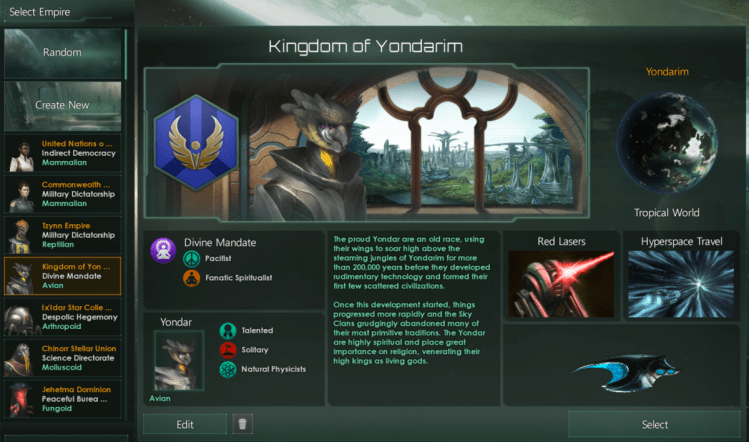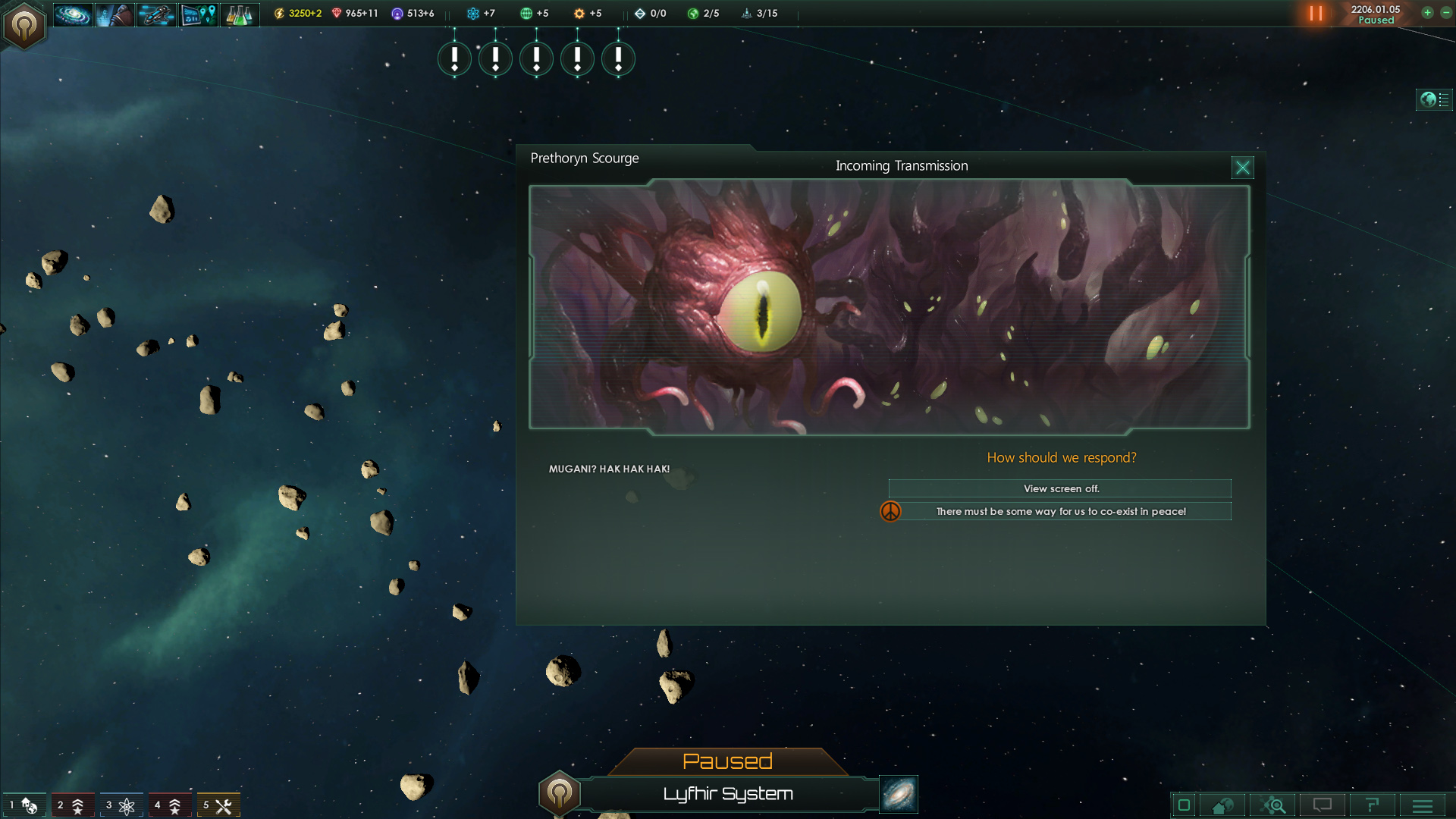
Above: Stellaris’ apparent answer to giant mutant spiders: angry eyeball monsters.
Combat seems optional and uninspired
As noted above, Stellaris’s combat looks amazing. I sometimes attacked other races just for the fun of seeing all those little ships in action. But that might be part of the problem: In order to see combat, I frequently had to be the one initiating it.
It might be that the Normal difficulty needs to be tuned up (or changed to Peaceful or Easy instead, perhaps) to make other races more hostile. Right now, difficulty settings give aliens bonuses to research and economy and make them less likely to ally with you — not, apparently, more likely to attack.
Hey, I’m not that bloodthirsty. I just like a little more “eXterminate” in my space strategy, if you know what I mean. And it would be nice, if I wanted to win by conquering everyone, if sometimes they hit first.
Once combat actually gets underway, I would appreciate more control. Ground battles grind out via auto-combat by default, and even in space battles, my ability to use actual strategy to protect and flank and distract felt limited, at least with default controls. But the fighting still satisfied, so again, this complaint felt minor.
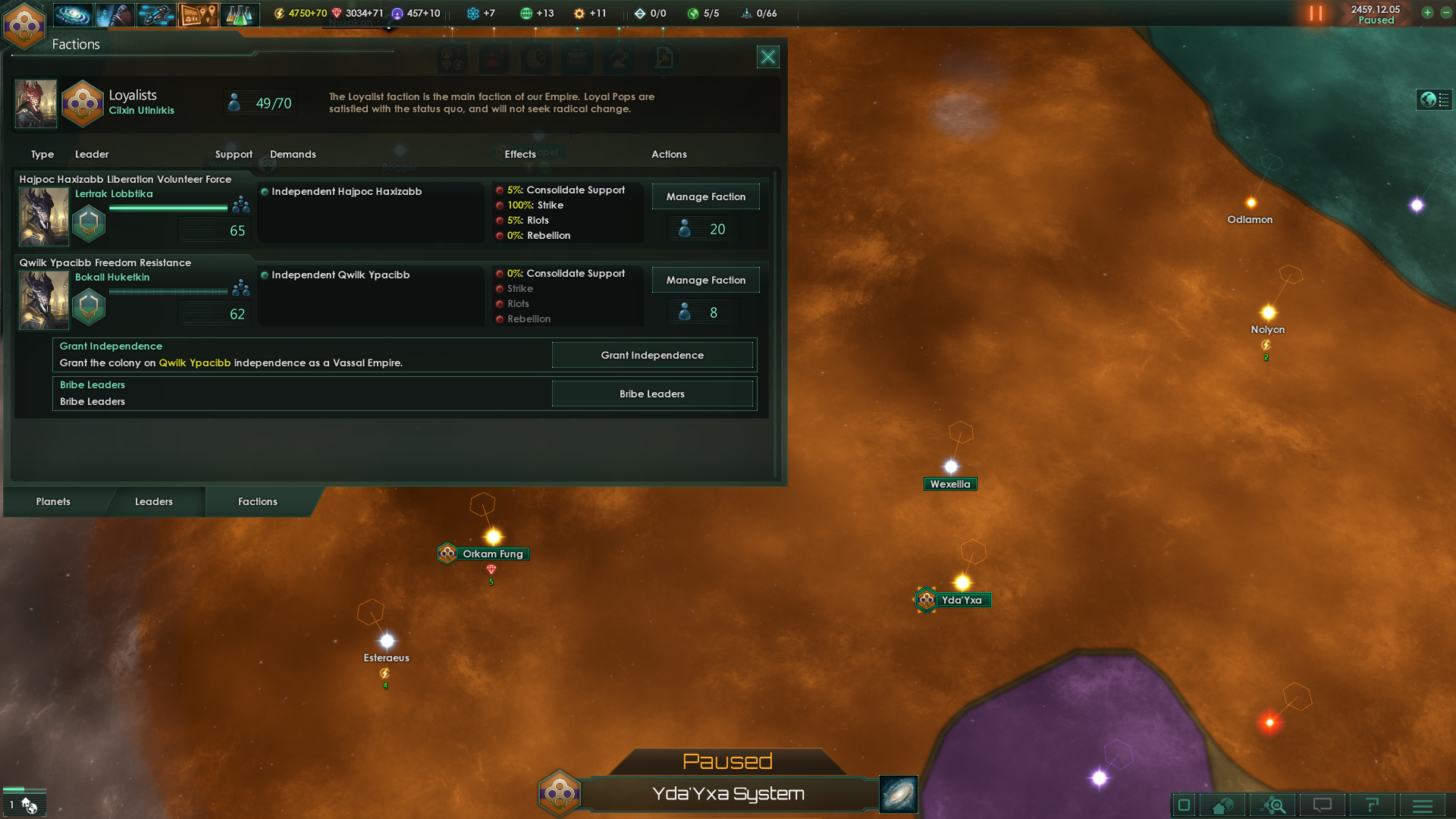
Above: Then again, one of your sectors could helpfully develop factions and break off to become independent and in need of attacking. You can always hope.
Real-time integration sometimes stuttered — as did the game
Most games like Stellaris choose to make the action turn-based for a reason. Grand strategy typically requires grand thought, and it’s difficult to do that effectively while your ships stream toward a destination. The “strategy” in real-time strategy games tends to be more limited, centering around a particular attack rather than the overarching goals of the game.
Stellaris has just two goals: control more than 40 percent of your universe, or conquer all alien races, which also felt a bit oddly limiting.
For the most part, the real-time nature of Stellaris worked well, but sometimes I would have appreciated the opportunity to have regular pauses in which to evaluate and consider. And heaven help you if you forgot and walked away while it was running after accidentally unpausing. I did that twice, both with games in the early stages, and both times had to abandon ship.
Stellaris also suffered from a few very minor technical issues. Performance during huge space battles slowed, and occasional bugs made me lift an eyebrow — but nothing seriously affected the gameplay.
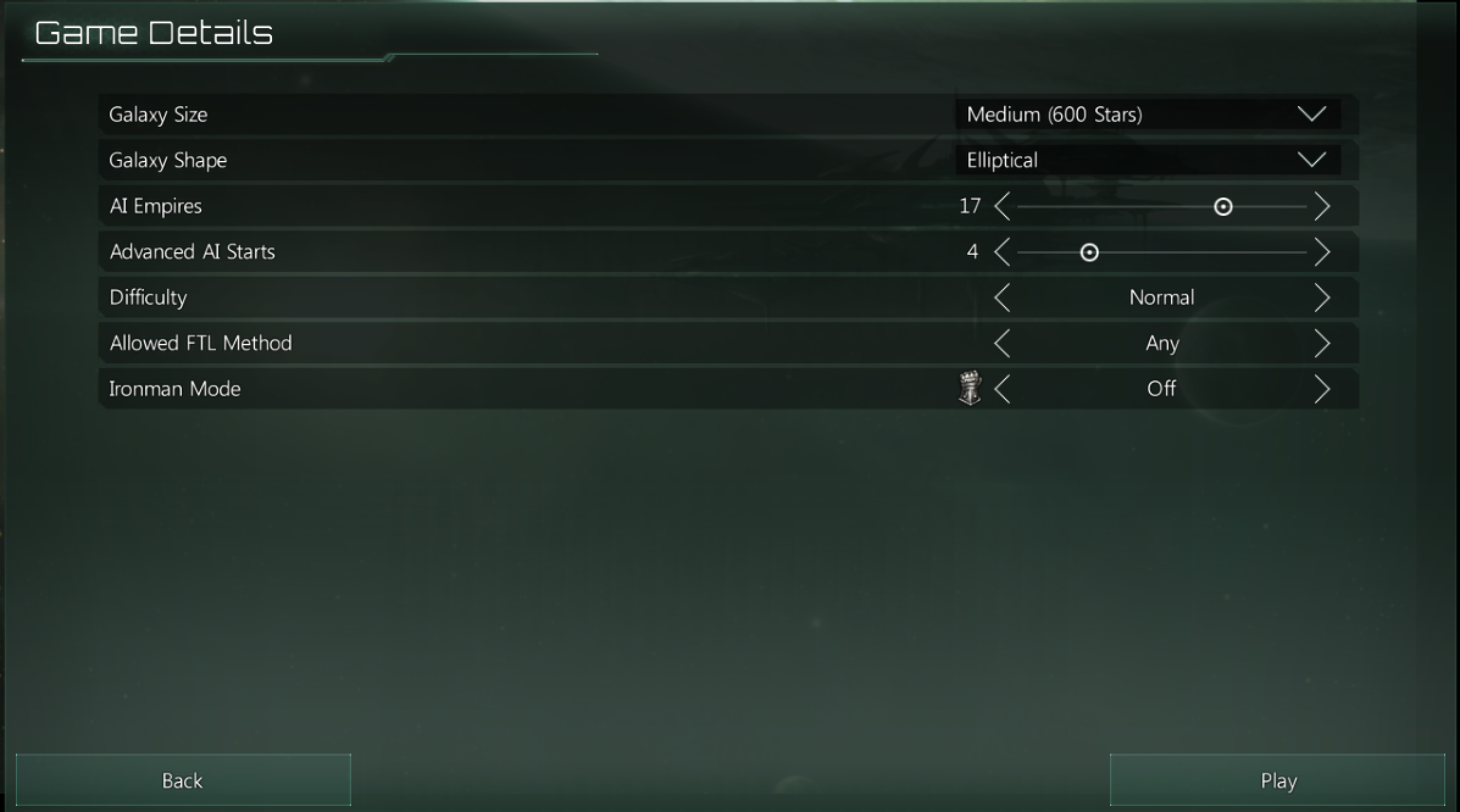
Above: Difficulty options don’t offer too many knobs to turn. “Ironman mode” disables custom saves, using a single autosave as you go so you can’t turn back.
Tech integration depends too much on RNG
When I started playing Stellaris, the research and technology system delighted me. Instead of a tree, it presented three options of what to choose next, giving me random progression as the game moved on. It made each game feel unique, and I appreciated the random “epic” tech that popped up, its welcome purple design inviting me to snatch it up.
You also have three types of tech to explore simultaneously in Stellaris: physics, society and engineering. That, too, felt like a lot of fun. You didn’t have to choose which direction to take your race; you could learn everything at once.
But there were too many times when I neared the end of a shorter game and discovered that one facet or another of my research was vastly behind, in part due to bad RNG for drawing that tech’s advances in my random three options. Truly, you could play through some games without ever noticing the problem; but when it happened, it irritated me.
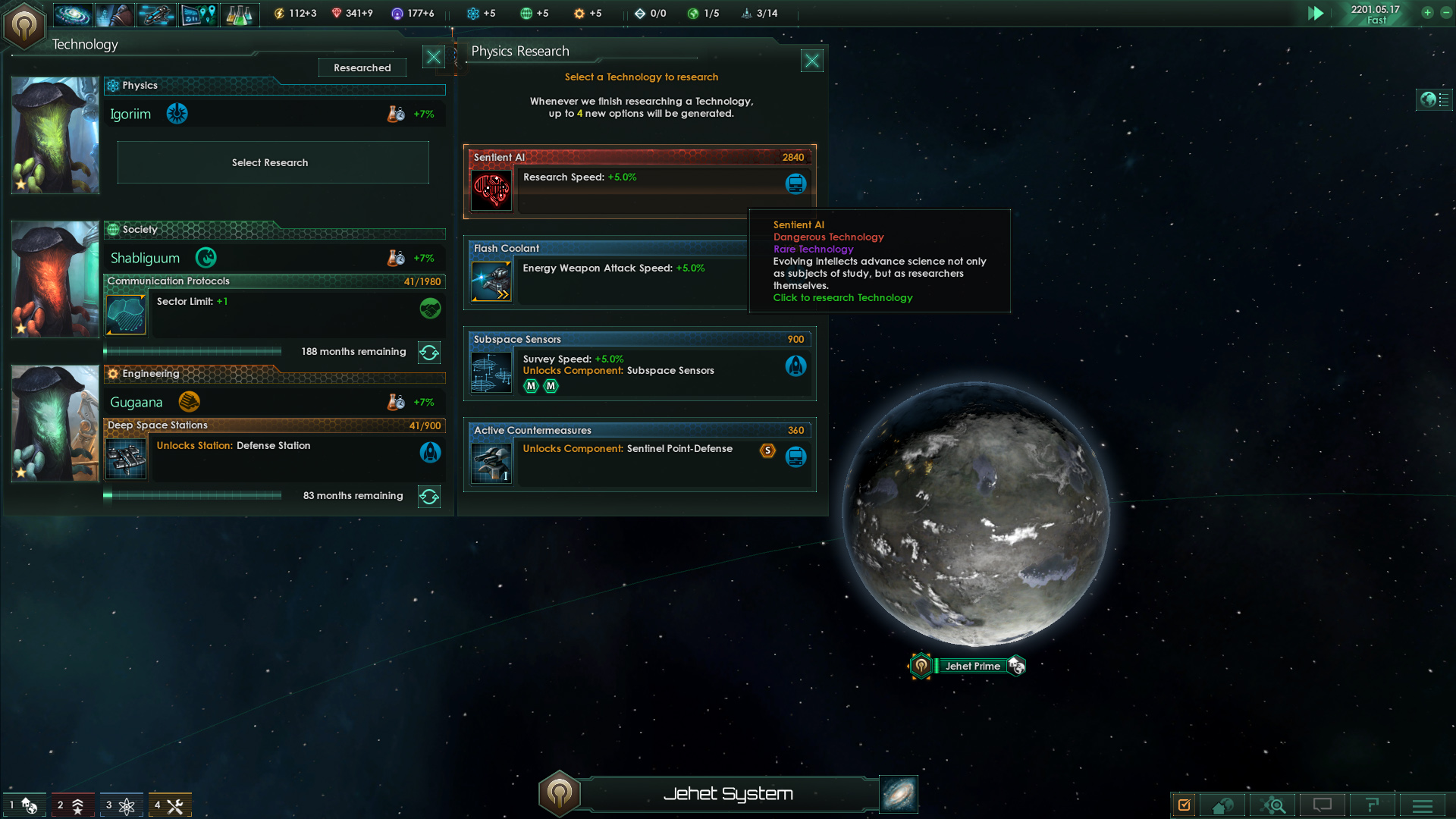
Above: Stellaris helpfully tells you that building sentient robots may not be the best idea. But no, you go ahead and build SkyNet. It’s fine.
Conclusion (so far)
Based on single-player action alone, Stellaris takes a place among the best space-based strategy games on the market. Its combination of real-time action, 4X structure and grand strategy aspirations makes possibly the best mashup I’ve ever seen of those genres, and that’s saying something. Yes, I had some quibbles about the intermediate stages of the game, and yes, it made the occasional misstep in how much control it chose to give me.
But overall, Stellaris wows, not just with the gameplay, but in the tiny details that make it so freaking enjoyable to play. Kudos to Paradox for the overall design and feel of this game; it felt as if they put a team of user experience analysts on the case.
Given how strategy games tend to evolve as they move along, I’m looking forward to expansions — or mods, which have some incredible possibilities here — that resolve some of my issues and add some extra victory conditions. But even without them, Stellaris puts the galaxy in your hands in a way that every once in a while feels magical.
Again, I’ll be updating this review after having had the chance to give multiplayer a good test.
Stellaris won’t expand strategy to a mass audience; while more accessible, it won’t appeal to people who like building things in reality rather than in concept. But if you’re like me, on the fence between 4X and grand strategy titles, you’ll enjoy the heck out of the single-player campaign.
Score: TBD
Stellaris is out now for PC and Mac. The publisher provided GamesBeat with a Steam code for the purposes of this review.
VentureBeat's mission is to be a digital town square for technical decision-makers to gain knowledge about transformative enterprise technology and transact. Learn More
